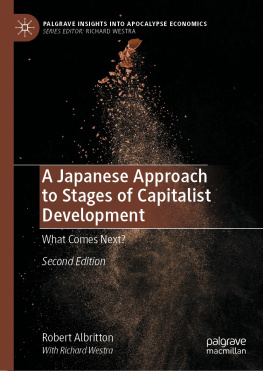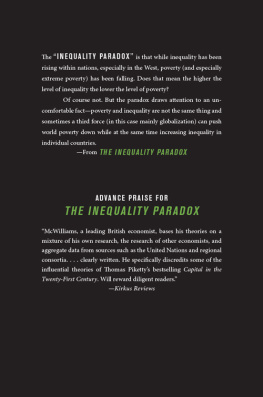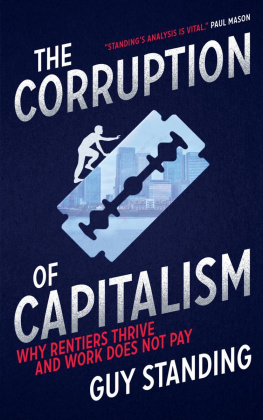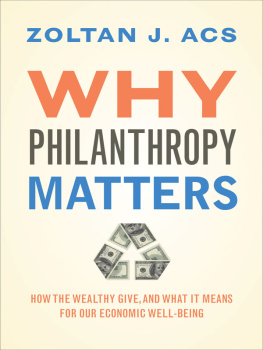
First published in Great Britain in 2017 by
Policy Press University of Bristol 1-9 Old Park Hill Bristol BS2 8BB UK Tel +44 (0)117 954 5940 e-mail
North American office: Policy Press c/o The University of Chicago Press 1427 East 60th Street Chicago, IL 60637, USA t: +1 773 702 7700 f: +1 773-702-9756 e:
Policy Press 2017
British Library Cataloguing in Publication Data
A catalogue record for this book is available from the British Library.
Library of Congress Cataloging-in-Publication Data
A catalog record for this book has been requested.
ISBN 978-1-4473-3565-8 hardback
ISBN 978-1-4473-3567-2 ePub
ISBN 978-1-4473-3568-9 Mobi
The right of Kozo Yamamura to be identified as the author of this work has been asserted by him in accordance with the Copyright, Designs and Patents Act 1988.
All rights reserved: no part of this publication may be reproduced, stored in a retrieval system, or transmitted in any form or by any means, electronic, mechanical, photocopying, recording, or otherwise without the prior permission of Policy Press.
The statements and opinions contained within this publication are solely those of the author and not of the University of Bristol or Policy Press. The University of Bristol and Policy Press disclaim responsibility for any injury to persons or property resulting from any material published in this publication.
Policy Press works to counter discrimination on grounds of gender, race, disability, age and sexuality.
Cover design by Lyn Davies Design
Front cover: image kindly supplied by www.alamy.com
Readers Guide
This book has been optimised for PDA.
Tables may have been presented to accommodate this devices limitations.
Image presentation is limited by this devices limitations.
Contents
The analysis of capitalism in crisis I present in this book has evolved from two earlier versions, one published in Japanese in 2015 and the other in Chinese in 2016. This book presents the same analysis as is in the earlier versions, using the same examples of the US, Japan, Germany and several other Western European countries, but my argument is reinforced by newly available data and the developments that have taken place since 2013 when I began to write the Japanese version.
However, since I submitted the manuscript to Policy Press in March 2016, numerous, notable political and economic developments have occurred, including Brexit the UK voting to leave the European Union and the election in the US in November 2016. The data, both macroeconomic and other data pertinent to my analysis, have also continued to change. These political and economic developments, the changing data since March 2016, plus some reflections on them are summarized in a brief Postscript to demonstrate how they support and even bolster the analysis offered in this book.
I express my sincerest gratitude to the following people who made this book possible. I would like to thank nearly two dozen friends in the US, Japan and Europe, most of whom are economists and some of whom do not agree with various aspects of my analysis. Yukio Noguchi and Guenter Heiduk, two friends, using virtually identical words, said my work is worthy of debate because it brings up a novel and important insight essential in discussing the crisis confronting the capitalism and democracy of the developed economies of today. The two anonymous referees who evaluated the manuscript for the Policy Press provided me with detailed and valuable comments and criticism that helped reduce errors and significantly improved this book. I am grateful to Alison Shaw, Director of Policy Press, who decided my manuscript with its unorthodox argument was worthy of being peer-reviewed. I am also grateful to Judith Oppenheimer who edited this book, substantially improving the exposition as well as correcting errors. And, finally, Susan Hanley, my wife, representing interested lay readers, spent countless hours to make certain that this book can be read by everyone.
A new perspective on capitalisms sickness
Advanced economies are so sick we need a new way to think about them.
Lawrence H. Summers, Professor of Economics at Harvard University and former Treasury Secretary and Director of the National Economic Council in the Obama administration ( Washington Post , November 3, 2015)
Introduction
My reason for writing this book is that I believe I have found a new way of thinking about the sick advanced economies, one that would help our efforts to reinvigorate the stagnating economies and floundering democracies of the worlds most developed countries.
Today, as the developed economies continue to stagnate and disparity in the distribution of income and wealth grows ever greater, a growing number of people are extremely concerned about the future both of the capitalist economic system and of the democratic political system. This book has been written with people in mind who are thinking about such crucial questions as the following.
What are the reasons for the continuing slow rate of economic growth?
Why is disparity in the distribution of income and wealth widening?
Has capitalism become incompatible with democracy? Or has capitalism always been inherently incompatible with democracy?
Can capitalisms sickness be cured, or must capitalism be replaced with another economic system?
Why hasnt the fiscal policy of reducing taxes and stimulating investment been successful? Have policies to increase the money supply helped our economies to grow? Or have they benefited only the wealthy?
If the rate of employment has been increasing, why are real wages stagnant, or even declining, for so many workers?
Why are the developed economies producing more and more luxury goods and services and at the same time investing much less than is necessary to meet societal needs, such as preventing further degradation of the environment and maintaining or improving the economic infrastructure and education?
I want to reach people who are pondering these and other related questions and explain my ideas, because they elect the politicians who will adopt the policies that are needed to effect change. Although academic publications are valuable in advancing scholarship, they are usually highly technical and are read by only a small number of people. This book is intended for a much wider readership.
Capitalist economies: the realities
Stagnation and its consequences
Before I set out my ideas, I want to note two realities in all of todays developed capitalist economies. The first is the sickness revealed in the real (inflation adjusted) growth rate since the 1980s. In the US, the rate of growth of GDP (Gross Domestic Product, the total amount of all goods and services produced) averaged only 2.62 percent from 1980 to 2007. Following the global financial crisis of 200708, it fell even lower, to just 1.42 percent between 2008 and 2014. In Japan, the same rate was 2.61 percent from 1980 to 2007 and 1.09 percent after 2008. The average growth rate in Europes five largest economies (Germany, France, the UK, Italy and Spain) was 2.42 percent before the financial crisis, but it turned negative, at minus 0.65 percent, during the period 200814.
For all of these economies, the average real GDP growth rate from 1980 to 2014 was dismally low compared to the 6.4 percent achieved from 1950 to 1979, when they were all growing rapidly, led by Japan in its high speed growth period and Germany during its miracle growth years.












